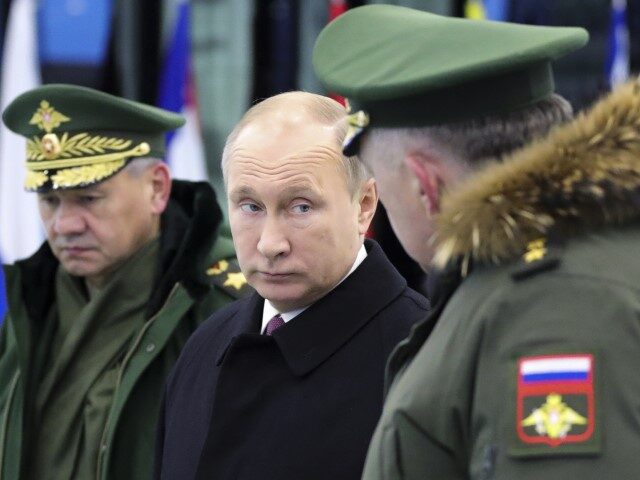Russian Deputy Foreign Minister Sergei Ryabkov suggested in an interview on Wednesday that his country could pursue new nuclear weapons deployments in response to the stationing of American long-range missiles and hypersonic weapons in Germany.
Russian officials have repeatedly stated they would not immediately dismiss the use of nuclear weapons if necessary to protect the regime of strongman Vladimir Putin from a potential NATO attack – or escalations in the ongoing Russian invasion of Ukraine. NATO powers are directly involved in the Ukraine war, though Ukraine is not a member of the military alliance, through the provision of military assistance to the country. Ukrainian President Volodymyr Zelensky was a special guest at the annual NATO summit hosted in Washington this month, where President Joe Biden introduced him as “President Putin.”
Ryabkov was speaking to the Interfax news agency on Thursday and responding to the July 10 announcement that America would increase its arsenal of weapons in Germany.
“I’m not ruling out any options,” he said, according to a translation by the Moscow Times, reportedly a suggestion that more nuclear deployments were possible to ensure Russia has the “widest possible optionality.”
“Considering the combined capabilities of NATO member countries, we must calibrate our responses without any internal checks in terms of what, where and when to deploy,” he asserted.
The Russian news agency Tass quoted Ryabkov offering other comments to reporters on Thursday indicating that Russia is preparing “various scenarios, including negative ones,” in response to American actions.
“However, no decisions have been made yet and the future of the [US strategic] bombers [B-52] has not been finalized, so we still have time to calculate various options,” he said, “and, then again, as with our response to joint activities by Germany and the US in Europe – on the ground in Europe – to determine the most effective and least expensive response.”
Russia’s ambassador to Berlin, Sergey Nechayev, similarly told Tass on Thursday that the move to position American missiles in Germany was a “risk” that Russia would give an “appropriate response” to.
Tass quoted Nechayev:
The joint statement by the United States and Germany is just another confirmation of Washington’s destabilizing policy after the Americans irresponsibly ruined the INF (Intermediate-Range Nuclear Forces Treaty – TASS) regime, which they unilaterally quitted back in 2019.
“Germany, by unquestioningly supporting the White House’s policy, is playing the role of NATO’s main pillar in Europe, despite the evident military and political risks,” he continued.
The diplomat’s remarks were significantly more measured than those offered by Kremlin spokesman Dmitry Peskov in the immediate aftermath of Washington announcing new missiles positioned in Germany.
“We have enough capacity to contain these missiles but the potential victims are the capitals of these countries [in Europe],” Peskov warned.
“Europe is coming apart. Europe is not living its best moment. In a different configuration, a repeat of history is inevitable,” he lamented.
The American military action that apparently prompted this outrage will begin in 2026, the White House announced in a statement on July 10.
“The United States will begin episodic deployments of the long-range fires capabilities of its Multi-Domain Task Force in Germany in 2026,” the White House confirmed in a statement with Germany. “When fully developed, these conventional long-range fires units will include SM-6, Tomahawk, and developmental hypersonic weapons, which have significantly longer range than current land-based fires in Europe.”
“Exercising these advanced capabilities will demonstrate the United States’ commitment to NATO and its contributions to European integrated deterrence,” the statement concluded.
The NATO summit in early July ended with the publication of a NATO declaration that heavily emphasized the importance that the alliance gives to its nuclear arsenal.
“Nuclear deterrence is the cornerstone of Alliance security,” the declaration read. “As long as nuclear weapons exist, NATO will remain a nuclear alliance. … NATO remains committed to taking all necessary steps to ensure the credibility, effectiveness, safety, and security of the Alliance’s nuclear deterrence mission.”
The declaration also condemned Russia for its “irresponsible nuclear rhetoric and coercive nuclear signalling, including its announced stationing of nuclear weapons in Belarus, which demonstrate a posture of strategic intimidation.”
“Russia has increased its reliance on nuclear weapon systems and continued to diversify its nuclear forces, including by developing novel nuclear systems and deploying short and intermediate range dual-capable strike capabilities,” the declaration added, “all of which poses a growing threat to the Alliance.”
Russia announced tactical nuclear weapons drills in May, calling them necessary to respond to Western “inflammatory statements” and to “practice employing non-strategic nuclear-weapons.” Prior to those drills, Putin himself repeatedly implied that he would consider the use of nuclear weapons if he felt sufficiently threatened.
“Russia will do everything to avert a global confrontation. At the same time, we will not allow anyone to threaten us. Our strategic forces are always combat ready,” Putin said in May at the annual “Victory Day” parade marking the end of World War II. The term “strategic” in this context typically refers to nuclear weapons.
In March, reportedly responding to French President Emmanuel Macron in an interview, Putin said, “The nations that say they have no red lines regarding Russia should realize that Russia won’t have any red lines regarding them either.”
Putin’s most belligerent henchman, former president and deputy chairman of the Russian Security Council Dmitry Medvedev, suggested in February, “attempts to return Russia to the borders of 1991 will lead to only one thing: to a global war with Western countries using the entire strategic arsenal of our state. In Kiev, Berlin, London, Washington.”

COMMENTS
Please let us know if you're having issues with commenting.